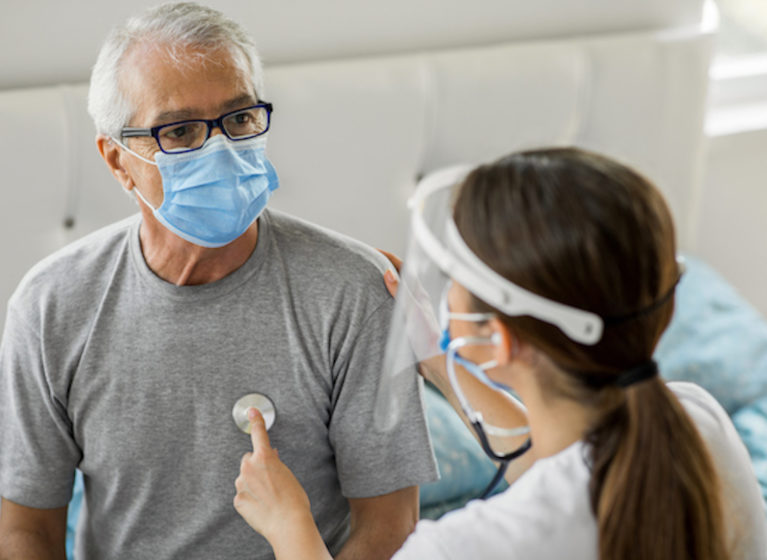
With headlines conveying news of more contagious strains of the coronavirus and cases of COVID-19 on the rise across the country, it’s no surprise that patients remain wary of venturing out to see a doctor. “UVA Health is taking every precaution to keep patients safe, yet many are still fearful of coming to the hospital and sitting in the emergency room because of the virus,” says cardiologist C. Michael Valentine, MD, MACC. “As a result, we have seen numbers decline particularly in acute heart attack care and care for acute congestive heart failure.”
As we reach the one-year mark since this pandemic began, findings like those at UVA and at hospitals nationwide confirming a decline in patient visits signal an urgent need for action. Organizations like the American Heart Association and the American College of Cardiologists are on board, encouraging providers to take some initiative to get patients — especially those with chronic conditions like heart disease — the care they’ve been postponing.
Here are some tips to help encourage patients to maintain their healthcare routines in the months ahead.
Put patients at ease
At UVA, stringent measures have been put in place to help limit the spread of coronavirus, including masking requirements, social distancing, patient and employee screening upon entry, limited visitation, as well as COVID-19 testing for surgical and admitted patients. To help your patients feel more comfortable about receiving care at this time, Valentine suggests actively sharing with patients your strategies for virus mitigation within your clinic.
Provide options for receiving cardiac care
If a patient calls to cancel an appointment, offering alternatives to face-to-face care may help avoid long delays or gaps in treatment that may negatively impact heart health. Thanks to technology, there’s a lot we can offer patients today through phone or telemedicine appointments.
“Our telehealth visits have helped dramatically with primary and secondary prevention,” says Valentine. “It’s all about talking to patients, recording what they’re doing, listening to what their needs are. This can make a critical difference in the maintenance phases of medicine that need to be ongoing.”
Make the most of telehealth appointments
Making the transition to caring for patients virtually can be challenging. That’s why the UVA Karen S. Rheuban Center for Telehealth has developed a new educational website tailored to healthcare providers that offers best practices and support.
TelehealthVillage.com provides accredited courses for individuals and institutions on the technical, professional, regulatory and financial considerations affecting the delivery of services. In addition to the course on the foundations of telehealth, there are also modules offering tips to virtually manage a variety of specific conditions.
For heart patients, Valentine suggests that providers can make an impact by asking the right questions and providing feedback and solutions to any barriers patients may face to care compliance. These questions might include:
- Are you taking your medications and refilling them as necessary?
- Are you watching your diet?
- Have you gained/lost weight?
- What is your exercise regimen?
In addition, Valentine says many patients are taking advantage of tools they can use at home to provide their care team with better information about their health. Some of these you might recommend are:
- A scale
- Home blood pressure monitor
- Cellphone apps to measure heart rate
- Smart watches
- Devices to record heart rhythm
“We’re seeing that even elderly patients are becoming more tech-savvy and are taking advantage of these devices,” says Valentine.
Be clear about when to seek emergency care
The more frequent touches afforded by telemedicine are, of course, no substitute for emergent care. Educating patients on the importance of seeking treatment immediately for life-threatening conditions is key to ensuring they get the right care at the right time.
“We have all seen the rising number of patients who don’t come in for a heart attack or other cardiac emergency and some of them die at home,” says Valentine. “Patients need to know that if they are suffering from chest pain or worsening shortness of breath, they should not delay care. They could suffer long-term or short-term consequences by sitting at home with heart attack or worsening heart failure.”
Don’t delay surgical referrals
Although there have been periods during the pandemic in which UVA has been accepting only the most urgent heart surgery referrals, there are currently no limits in place. “Fortunately, our COVID admissions are declining and we’re hopeful those numbers will continue to go down,” says Valentine. “It can change from week to week, but right now, we’re taking all surgical referrals.”
For elective heart procedures, if patients can wait without harm, some are opting to postpone select surgeries. However, UVA has put measures in place to offer these procedures safely as well.
Reinforce need for and safety of vaccination
If we are to continue chipping away at the number of COVID-19 cases and resume providing optimal cardiac care, we have to champion vaccination, says Valentine.
“As providers, one of the best things we can do is to encourage patients, healthcare workers and first responders to get vaccinated,” he says. “If we don’t – if patients do not get the vaccine because of fear – then we continue to prolong the pain and misery of this pandemic and we prolong problems with cardiac issues because we’ll continue to have delays in care.
Patients need to know that the potential risks of the vaccine are low compared to the gain, not only individually, but for our society as a whole.”